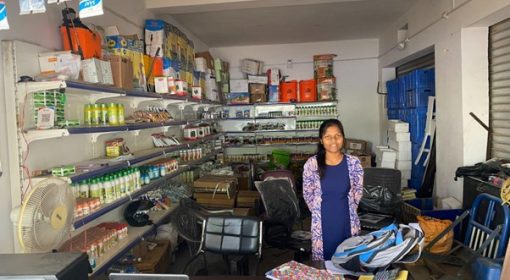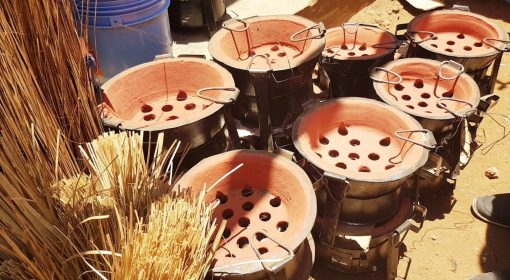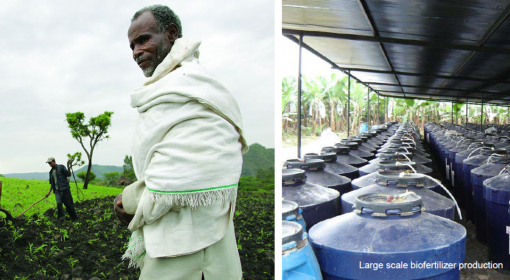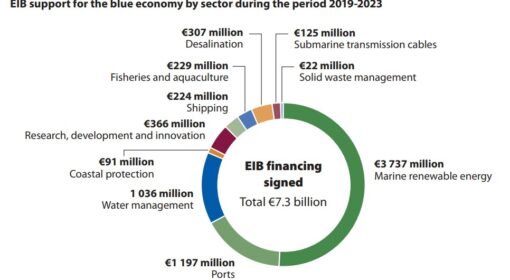By Frank van Steenbergen
May 26, 2020
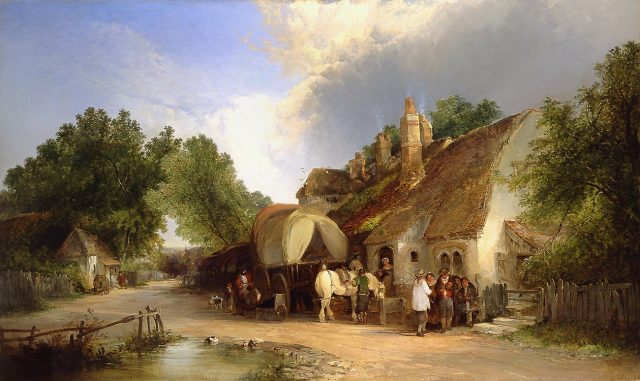
Image: Old Road Side Inn by Edward Charles Williams 1807-1881
First, a story with a traveler. One evening a traveller arrives in a small town. His plan is to reach his family in the capital city, but it is late and he does not like travelling at night. He knocks the door of a small village hotel and asks the owner if there is still a bed for the night. There is, the owner says, but “because you will leave early morning would you mind paying in advance?”, he asks. And so it so happens. The traveler pays USD 30 and retreats to his room.
As soon as the hotel owner has the money, he goes to the local beer brewer who supplied to his hotel. I still owe you USD 30, the hotel owner tells the brewer. Now I come to pay you.
With the payment from the guest, the local beer brewer runs to the barrel maker. You made this new barrel for me and I did not pay you yet, but here is your payment.
The next step is for the barrel maker to go to the dress maker. “Remember you made the dresses for my daughter’s wedding and I could not pay you?” says the barrel maker. “Here is USD 30,” the barrel maker says. “Please accept it as a first payment.”
Thanks, say the dressmaker, who goes to the hotel owner. “I have been drinking here for many nights and I owe you this USD 30. Please accept.”
At that time the traveler comes down stairs. “I have changed my mind,” he tells the hotel owner. “I think it is better if I proceed to my family and travel tonight.” “I understand,” says the hotel owner. “Would you mind giving me the advance back?,” asks the traveler. “Of course,” says the hotel owner.
So this what money is all about: a medium that goes around and that help us to connect and exchange our services and good. The more the variety of good and services that we offer the longer the chain in which money moves around. If no one brews beer, we will not spend money on it, nor are their brewers who may purchase money. If there is no barrel maker, then nobody will produce the useful barrels and no one will spend the money that is earned with making barrels. And the economy will not roll. Same with the dress maker: if there is no one to make wedding dresses, weddings would be less fun, but also no one would be able to spend the money that was earned with making the dresses. And so and so forth. This why diversity is important, why it is a large driver in any economy. It is what creates the circulation, a continuously increasing web of services – with money being earned and spent. Here is the hope for rural economies to create more jobs and have a higher quality of services.
Diversity is not a given. Not every area has the same dynamism. We did a survey on new business that is created in Ethiopia when a road is built and opens up an area. The variety of business was small: primarily general food stores and hair dressers. There were many other types of useful business one could think of, but they did not exist. Yet in a similar rural area in Kenya one would find hardware shops, food processors, transport business, even investment advisors. It is not that these could not exists in Ethiopia – they just did not.
The reasons can be many: competition from public sector or corporate business, regulatory constraints, no tradition of entrepreneurship or just the way things enigmatically developed. But an overriding one is usual that they did not exist because no one started to create them. At the same time we have the Enormous Paradox – on the one hand we have a lot of useful things that are not done, on the other hand we have many employed people that are unhappy, frustrated and sometimes aggressive. Youth unemployment these days – combined with social media – creates the force to topple governments.
Another example from Ethiopia. In some districts of Amhara 45% of the crop was lost due to rodent infestation. What reaction did it provoke? Not much, surprisingly. No increase in rat trapping or better storage, no increase in specialists providing these. A modest increase in people keeping cats and people breeding them, but all in all not many opportunities were seized.
Now there is enormous good news in this bad news. We now often have the paradox of many things that are not being done (but that would provide a useful good or service) and at the same we have many young people unemployed. In strengthening local economies and providing more jobs, more well-being and a higher level of services in many economies is the way forward. To increase this web of local good and services. In creating strong local economies diversity is better than quantity – as competition means choices and diversity means additional options and added value. We think this circular growth model is more appropriate for many part of the world, that will never be able to compete with China for consumer items, with India for software, or South Korea for mobile phones. Their way forward is to have stronger locally bolstered economies – not to capture a position in the world market.
We need to look at the inner strength, the viriditas of local economies, rather than the external linkages. In economic theory there has been a strong interest in competition between individuals, enterprises and countries rather than in linkages and adding value. There is a mindset to look at producers and customers as separate entities and not consider that he/ she who is a receiver may also be a giver. We need to understand better how to promote this local circularity – also in the post COVID19 restart of the economies.
How can we do this:
- Invest in diversity of skills and services – through training , loans and contracts, looking at the opportunities: we believe that many of these exist in agri-services, for instance, and providing inputs for regenerative farming
- Look out for leaks – find ways to how to make money circulate locally rather than ‘escape’
- Inject ‘fuel’ – through procurement in large public programs inject money– in the local economy
- Protect against sharks – corporate business expanding into every corner of the local economy, for instance local food and drinks, creating free rides for themselves in the absence of strong local enterprise
- Look out for killers – government organizations and cooperatives providing local quality of services that stand in the way of more vibrant and creative local business
- Look for dead hand regulators – regulation is good but it is sometimes used to exclude competition and set standards that are not useful and only protect well-entrenched large enterprise
- Provide the lubricants – roads and transport – they may lower the costs of local service being provided and for instance create opportunities for marginal items, such as agricultural by-products
- Promote entrepreneurship – the ability to seize opportunities and having the reserves to do so; to think that one can take things in one own hand, that yourself can create something new, useful and viable.

